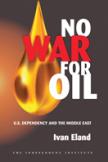Energy Futures
In No War for Oil, Ivan Eland, senior fellow and director of the Center on Peace and Liberty at The Independent Institute, makes a strong case against going to war over oil or any other commodity. His argument that a worldwide market for oil free of government interference would negate the need for wars is not very convincing.
Imagine an intricate system of interconnected pipes, pumps, valves, reservoirs and spigots; each juncture in the system is independently operated. Then imagine that the system of pipes carries a product that billions of people depend on to maintain their ways of life. That would come close to how Ivan Eland describes, in much finer detail, the world oil market and a history of the United States government’s attempts to manipulate the market to its advantage and to the disadvantage of its enemies, through wars, embargoes and agreements between allied nations.
Eland begins his book with 11 myths he wants to refute, including the myths that we have reached peak oil supply worldwide; that OPEC controls oil prices; that becoming independent of foreign sources of oil is a viable and even desirable goal; and that the United States must support dictatorial and terrorist-supporting Saudi Arabia in order to protect U.S. oil supplies and therefore U.S. national security. Eland makes a strong argument in each case, but I kept coming up with valid counterarguments, especially in regard to peak oil. Oil is already becoming harder to get out of the ground, from under oceans and from tar sands. At some point the energy used to get the oil will equal the energy we get from the oil.
The author continues with a review of the tangled history of oil and those who produce it, transport it, refine it and buy it, from the late 19th century, when the British switched fuels on their navy ships from coal to oil, through two world wars, several Arab-Israeli conflicts, the first and second Persian Gulf wars and the ongoing war in Afghanistan. There were game changing events along the way, including the promulgation of the Carter Doctrine, named after its creator, President Jimmy Carter. The doctrine holds that a threat to oil resources in the Middle East will be considered a threat to a U.S. vital interest and that the United States will use force, even military force, to protect that vital interest.
Eland suggests that the United States remove its troops from the Middle East, stop subsidizing the U.S. fossil fuel industry and discontinue special relationships with certain oil producing nations. I agree with his overall conclusion that fighting wars in order to secure our supply of oil has led and will continue to lead to unnecessary death, suffering, economic losses and even higher gasoline prices—the outcome the wars are supposed to eliminate. But I do not agree that a truly free market for oil will bring about an end to conflict over the resource.
The words market, merchant and mercy all have the same linguistic roots. In a sense, the fair exchange of goods and services is the most basic form of love. Unlike the highest forms of love exemplified by Jesus Christ—a self-sacrificing love—commerce, on its face, increases the good of all parties involved. But there are all kinds of relationships in the world, both equitable and forced. Why would a market primarily controlled by the law of supply and demand work better than one regulated by governments? Paraphrasing St. Paul, we have laws because of sin. No sin—no laws and no wars. Markets are just as vulnerable to manipulation by market players as are governments. At least with democratic governments, the intention is to look after the good of the whole governed nation. And there is a very vigorous market for the weapons of war. What about that market? Will it cease to exist?
Nonetheless, I agree with Eland in one sense. Through exchange we will optimize the chance of a durable peace and cooperation among nations—but an exchange not only of goods and services but of culture and experience as well. In general, we need more and varied kinds of relationships among peoples and cultures and not more restrictions. But as long as human beings are involved, we need some commonly understood and accepted rules for the road.
This article also appeared in print, under the headline “Energy Futures,” in the July 16, 2012, issue.








